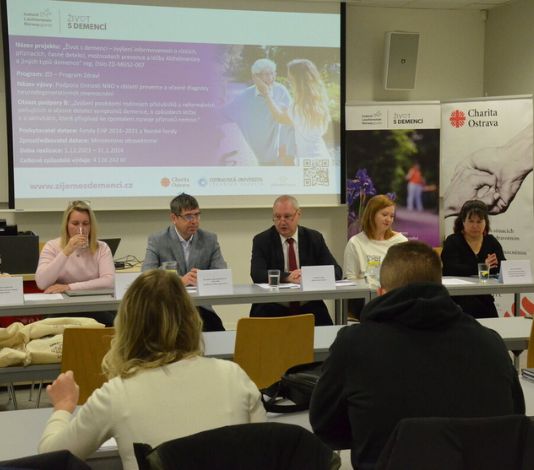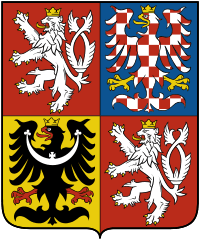Living with dementia - the project of Charity Ostrava contributed to the awareness and support of informal care givers

Published
The disease of dementia fundamentally changes the life of the sick person and their loved ones. Family support, stable support and the use of professional services enable the person with dementia to live his or her life as well as possible. Charity Ostrava, the Faculty of Medicine of the University of Ostrava together with their partners realized a project aimed at disseminating information about living with dementia and supporting informal caregivers.
"The purpose of the project of Charity Ostrava supported by the European Economic Area (EEA) Grants was to raise awareness of dementia, to carry out activities and to create an information structure that will help people in a life situation when their loved one becomes ill, for example, with Alzheimer's disease. Family caregivers and informal caregivers often do not know how to treat their loved ones and which services can help them to make the quality of life of the ill person and of themselves as good as possible," says Martin Pražák, director of Charity Ostrava.
The following activities were carried out in Ostrava and Olomouc as part of a two-year project entitled "Living with Dementia - Increasing Awareness of Risks, Symptoms, Early Detection and Prevention of Alzheimer's Disease and Other Types of Dementia," which was supported by the EEA Grants through the Ministry of Health of the Czech Republic in the amount of CZK 4,126,242: excursions, interactive lectures, practical workshops, support groups for carers of people with dementia and other awareness-raising events, which were attended by several hundred people in total. A website www.zijemesdemenci.cz, social media profiles, instructional videos, and public information brochures were created.
The Faculty of Medicine of the University of Ostrava was one of the partners of the project due to its long experience in the field of education and implementation of present educational events for the general public. Prof. David Školoudík, M.D., Ph.D., FESO, FEAN, Vice Dean for Science and Research of the Faculty of Medicine of the University of Ostrava, says: "With the increasing number of people diagnosed with Alzheimer's disease or other types of dementia, it is necessary for families and caregivers to know how to care for this group of people. In the near future, it will not be capacity-constrained for all care to be provided by specialty care organizations alone." On mitigating the effects of the disease and the importance of early diagnosis, Prof. Školoudík adds: "It is important to recognise the symptoms of an emerging disease, to adapt care to current needs or to seek specialist help, or to include appropriate intervention to stabilise the patient's condition or at least slow down the progression of the disease."
"There is still a stigma attached to the topic of dementia. People are often not informed about what dementia is, what its symptoms are, the possibilities of prevention, what the health and social care and assistance system provides. Lack of information can lead to postponement of diagnosis and therefore to a poorer quality of life. In Ostrava, social services are available to help care for people with dementia," says Marta Machová, manager of the working group Seniors of Community Planning of Social Services in Ostrava.
One of the care providers in Ostrava is Alzheimer Home Ostrava, which was also a partner of the project. "Our specialization is comprehensive care for the elderly and patients with Alzheimer's disease and other diseases causing dementia," says Mgr. Katarína Valentová, regional director of Alzheimer Home.
"Thanks to the implementation of the Living with Dementia project, an opportunity has been created to provide people with information on where to turn, how to approach their loved ones in informal care. A follow-up activity of the project is, for example, the offer of a programme called "It's still me" at the Gabriel Charity Centre in Ostrava-Zábřeh for people who are newly learning about the diagnosis of dementia," says director Martin Pražák.

Project conference, source: Charity of Ostrava
Project: Living with dementia - raising awareness of the risks, symptoms, early detection, prevention and treatment options for Alzheimer's and other types of dementia, ZD-MGS2-007
Project Provider: Charity of Ostrava
Total Grant: 4 126 242 CZK

